
My doorbell rings. I open the door to find a good friend of mine standing there with a big grin on his face and a bag casually slung around his shoulder. Minutes later, he’s settled at my kitchen table and reaches into his bag. “We’re going to Bologna!”, he announces. “You’ve been talking so much about it, we decided we should go and see it for ourselves”. Now it’s my turn to grin. He pulls out a map, a pen and a notepad. “Ok, what do you recommend?”. My mind starts to race and quickly goes into checklist mode. Gosh, where do I start? There are so many things to do in Bologna, one of my favourite cities in Italy. Thirty minutes later, he’d filled several pages in his notebook and his map was covered with more scribbles. Here’s what I told him:
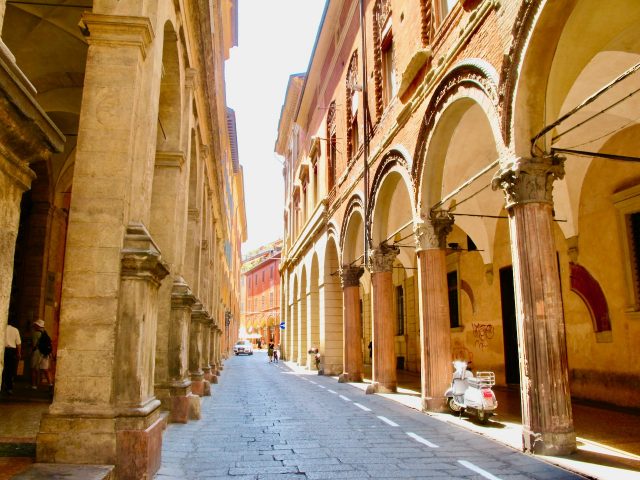 A quiet street in Bologna.
A quiet street in Bologna.

1. Stroll under the porticoes
I kicked off with one of my favourite things to do in Bologna: stroll along the porticoes. Built from the late-Middle Ages onwards, these porticoes are synonymous with Bologna, offering shelter for pedestrians on the ground level and additional housing space on the upper levels. Wherever you go in Bologna, it’s a treat to walk under these elegant arches. Some of the best examples can be found along Via Marsala (especially the historic porticoes at Palazzo Grassi), Strada Maggiore (Isolani House) and Via Farini (the examples around Piazza Cavour feature striking frescoes on the ceilings).
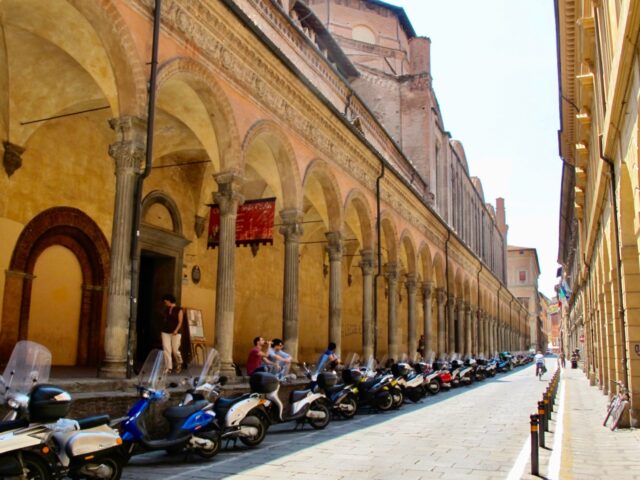 Bologna porticoes
Bologna porticoes 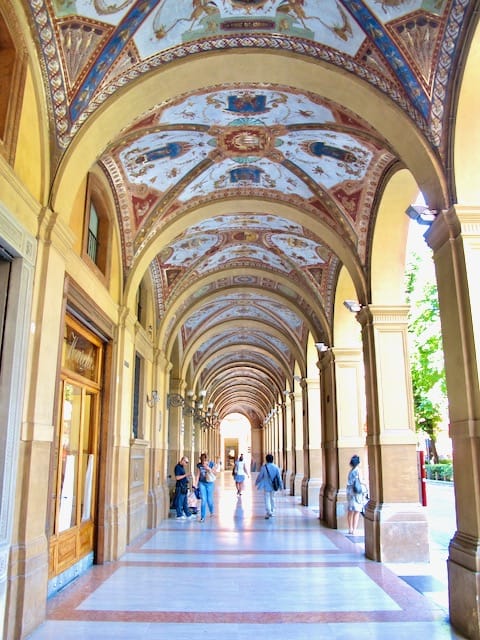 This gorgeous arcade can be found near Piazza Cavour.
This gorgeous arcade can be found near Piazza Cavour.
If you enjoy a good hike, consider the hike through the porticoes that lead 4 kilometers from the city centre up to the Sanctuary of San Luca in the hills behind Bologna.
2. Explore Piazza Maggiore and its surroundings
Piazza Maggiore is the central point of Bologna. Around it are numerous historic buildings such as the Basilica of San Petronio (with its striking, unfinished façade), Museum of Archaeology, Palazzo dell’Archiginnasio (the 16th century library of the University of Bologna) and adjacent Anatomical Theater, Palazzo d’Accursio (14th century town hall and fine arts museum with a clock tower), Palazzo Re Enzo (a grand 13th century palace) and the iconic Fountain of Neptune. To learn more about the most important sights in Bologna, I recommend joining a walking tour.
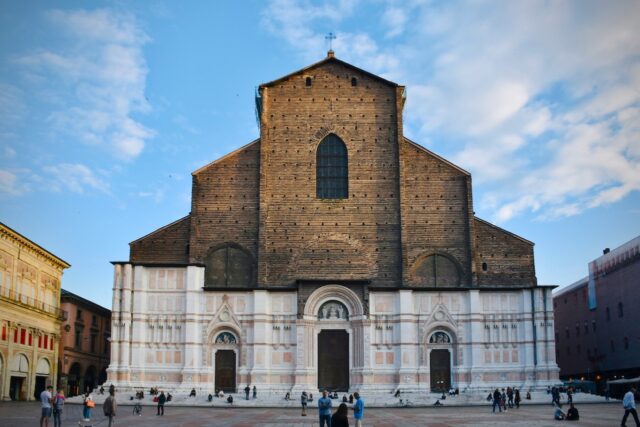 Basilica of San Petronio (image by A.Semoner/Unsplash)
Basilica of San Petronio (image by A.Semoner/Unsplash) 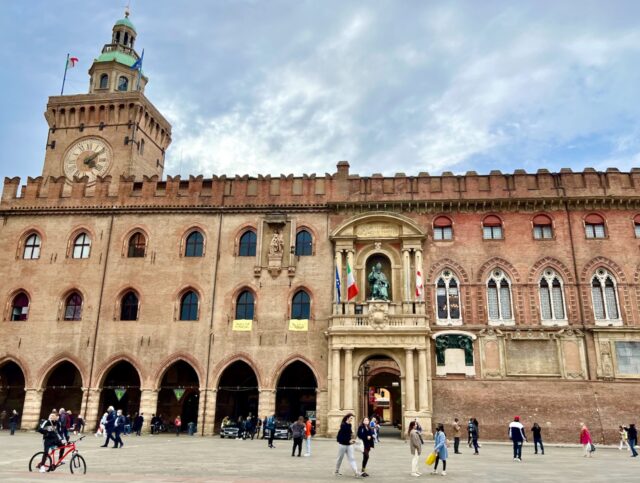 Old Bologna Town Hall and its Clock Tower
Old Bologna Town Hall and its Clock Tower 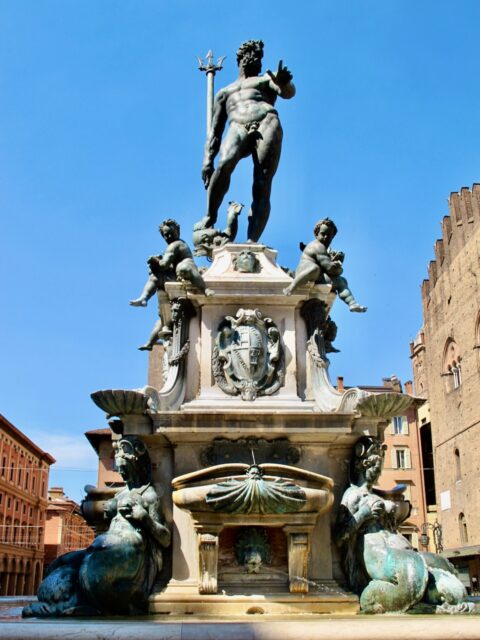 Neptune Fountain
Neptune Fountain
3. Visit the Seven Churches
The Basilica of Santo Stefano, located on a piazza of the same name, is a religious complex consisting of numerous churches which were built side-by-side across many centuries in different architectural styles, starting in the 5th century AD.
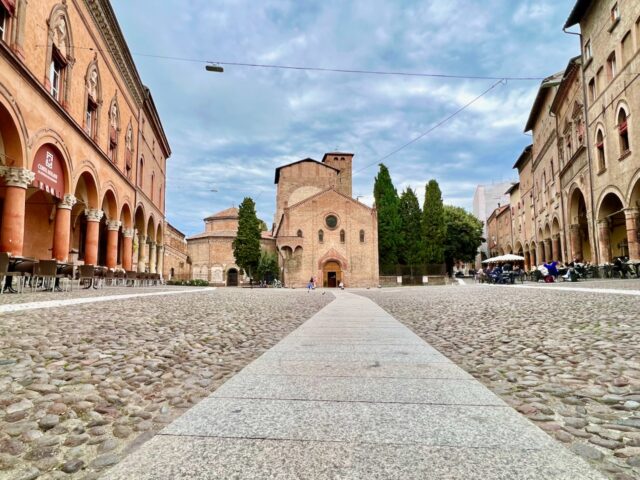 Piazza Santo Stefano
Piazza Santo Stefano 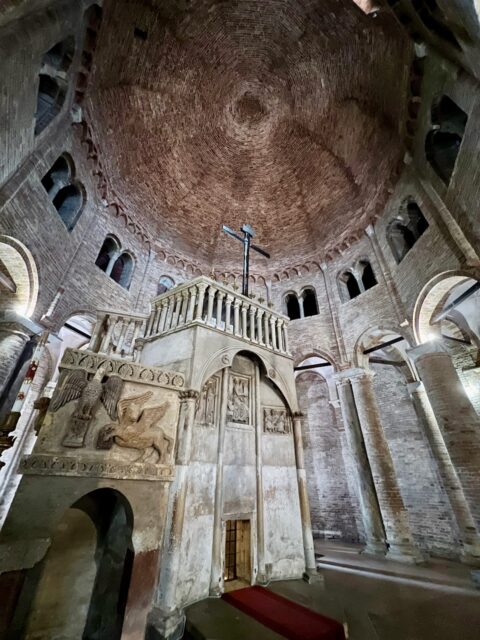 Church of the Holy Sepulchre (5th century AD)
Church of the Holy Sepulchre (5th century AD)
4. Enjoy a panoramic view
There are numerous medieval towers and enjoying an aerial view is one of the top things to do in Bologna. For the best views of Bologna, head for the city’s iconic Two Towers: Asinelli and Garisenda. Constructed in the 12th century, these towers are a sight to behold (the fact that they’re very visibly leaning adds to the suspense). Read about climbing the Asinelli Tower.
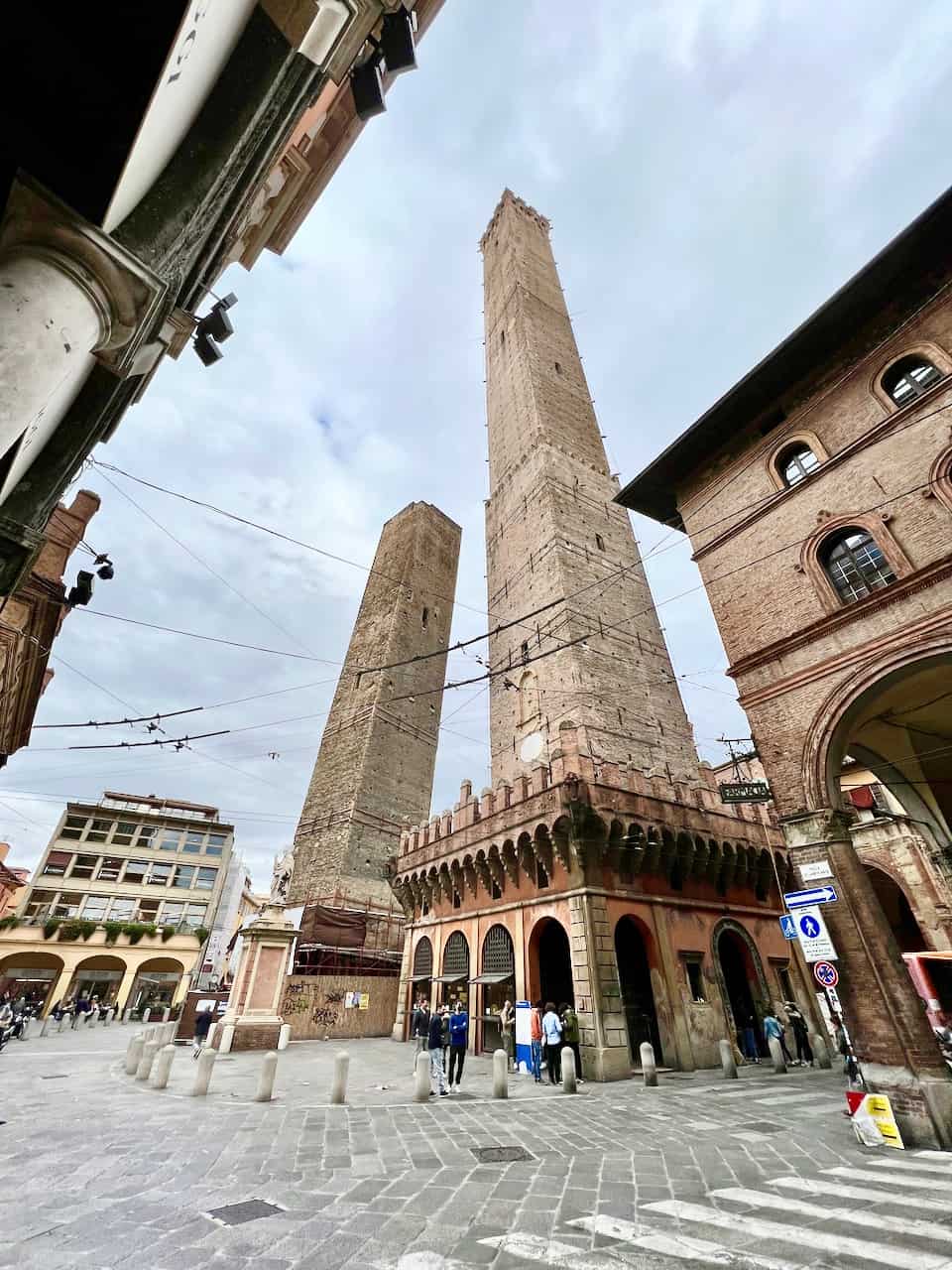 The leaning towers of Bologna.
The leaning towers of Bologna.
The Asinelli Tower has the distinction of being the tallest leaning tower in Italy, surpassing its more famous sister in Pisa. You can embark the climb up 498 steps inside the tower. I don’t recommend it if you’re afraid of heights as the steps are narrow and steep, but once above, the panoramic views of Bologna are truly astounding.
[Note: due to ongoing restoration/reinforcement work, the Asinelli tower may be closed. Please check in advance.]
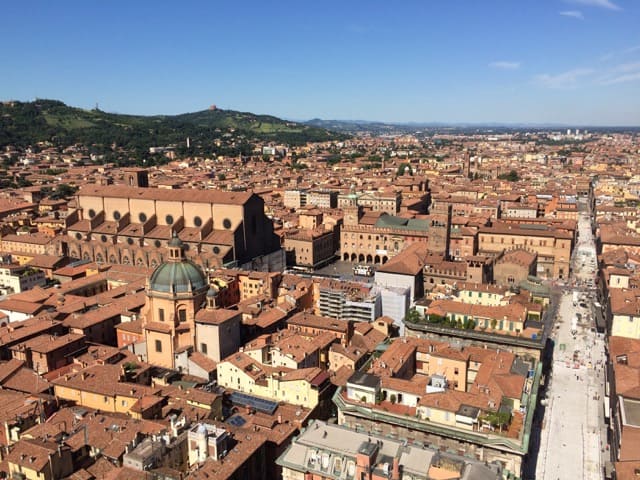 A panoramic view of Bologna.
A panoramic view of Bologna.
For a less-intensive climb, head to the Clock Tower at Piazza Maggiore. There’s a lovely view of the piazza and the city skyline from the terrace.
Booking.com
5. Mingle with the locals
Being home to the oldest (continuously-operating) university in Europe, Bologna is awash with 80,000+ students, giving the city a young, vibrant feel despite its grand age. There’s no better way to soak up this atmosphere than to spend an evening strolling around the University District between Via Zamboni (especially Piazza G. Verdi) and Via delle Molline/Via Mentana/Via Marsala. Drop in for a drink at one of the many student watering holes in this district.
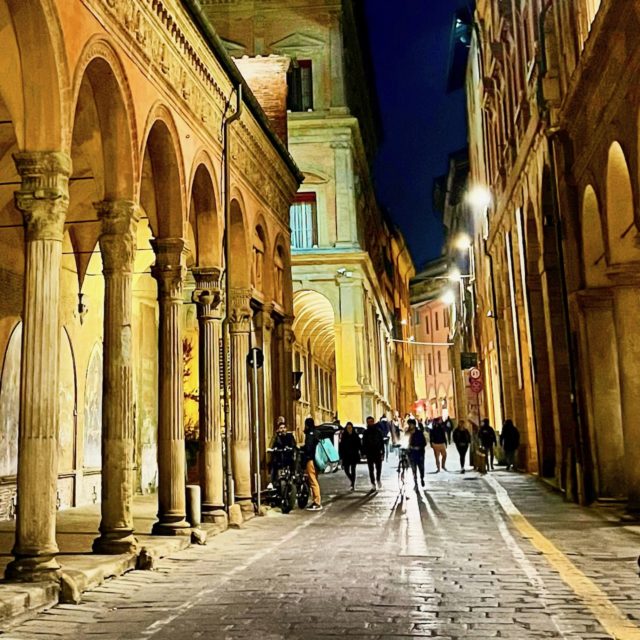 Streets in the University district are particularly vibrant in the evenings.
Streets in the University district are particularly vibrant in the evenings.
Read more about the ultimate Emilia Romagna road trip
In the summer, the little square in Via Belvedere at the steps of the Mercato delle Erbe come alive as locals crowd into this space for fresh food and delicious wine. The atmosphere is very casual and at times boisterous – small stalls sell a variety of pastas, pizzas and wines, and you can sit at one of the rickety tables or on the stairs of the market for a fun evening with the locals.
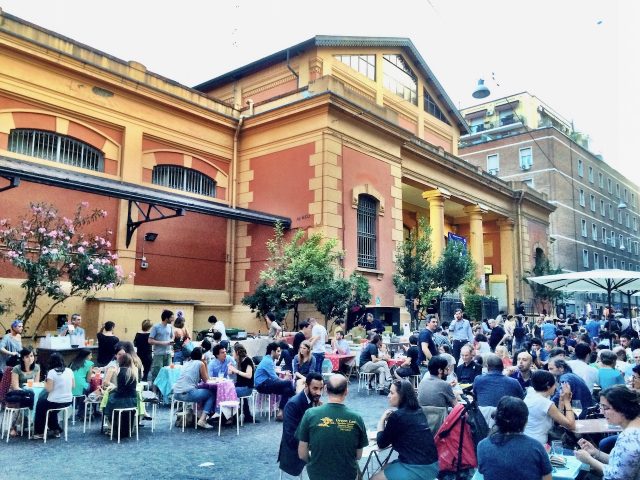 Summer evenings at Via Belvedere.
Summer evenings at Via Belvedere.
I also recommend having an aperitivo (happy hour drink) in the Quadrilatero district (the medieval market) just off Piazza Maggiore.
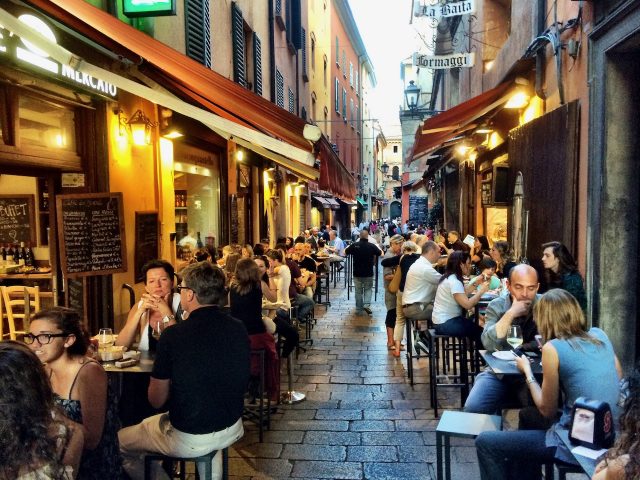 Aperitivo in Via Pescherie Vecchie (Quadrilatero district).
Aperitivo in Via Pescherie Vecchie (Quadrilatero district).
6. Immerse yourself in Bologna’s cuisine
Bologna is a culinary paradise. It’s not hard to find a good, authentic ristorante, trattoria or osteria in the historic centre. Just follow your nose. Oh, and on a side note: if you see a restaurant offering Spaghetti Bolognese on the menu and you think it can’t get more authentic than this, think again. Spaghetti Bolognese is only served in tourist restaurants. In Bologna, for the authentic experience, try tagliatelle al ragu. Other Bolognese specialties include tortellini, tortelloni, mortadella and cheeses like stracchino and squaquerone. You’ll learn all about this and much more at a cooking course.
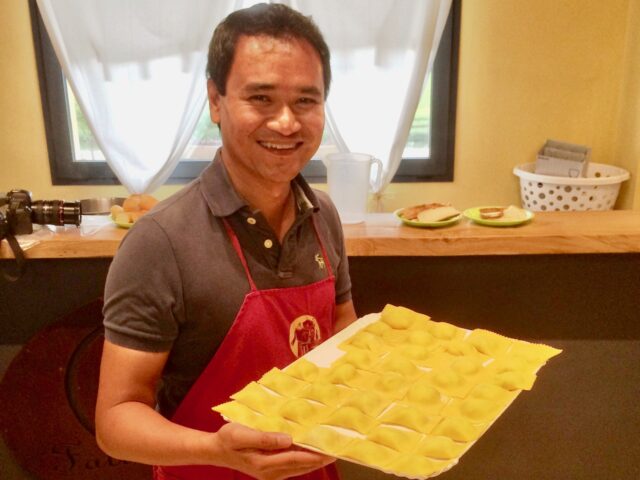 Your’s truly at a pasta-making class.
Your’s truly at a pasta-making class.
If you’d like to buy fresh pasta to bring home, I recommend Le Sfogline (7B Via Belvedere; map), opposite the Mercato delle Erbe (market), where Renata and her two daughters make the best fresh pasta every day.
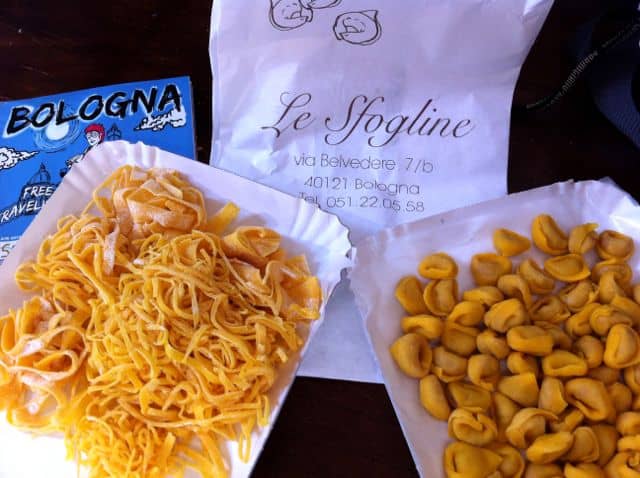 Learn how to make fresh pasta!
Learn how to make fresh pasta!
I also recommend joining a food tour to learn more about Bologna’s amazing food scene. You’ll experience food tastings in various artisanal food shops and markets.
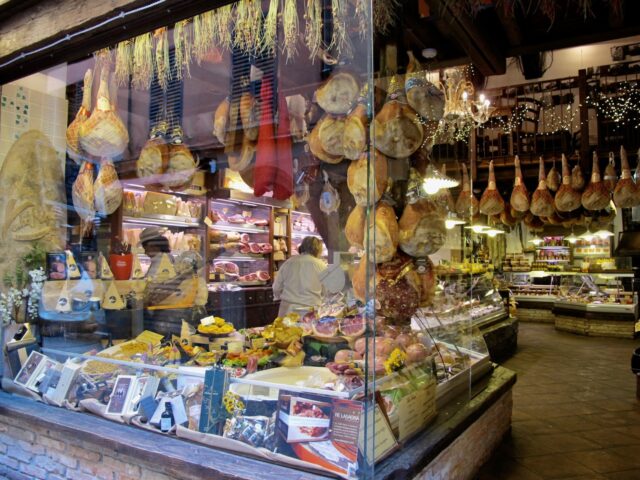 An artisanal food store in Bologna
An artisanal food store in Bologna
7. Own the streets on Sunday
Every Sunday, the main avenues in Bologna turn into a pedestrian zone. It’s a special treat to walk down these grand boulevards such as Via dell’Indipendenza free of traffic except for the odd bicycle. Performers take to the streets, making it an entertaining stroll, but the ambiance will make the biggest impression on you.
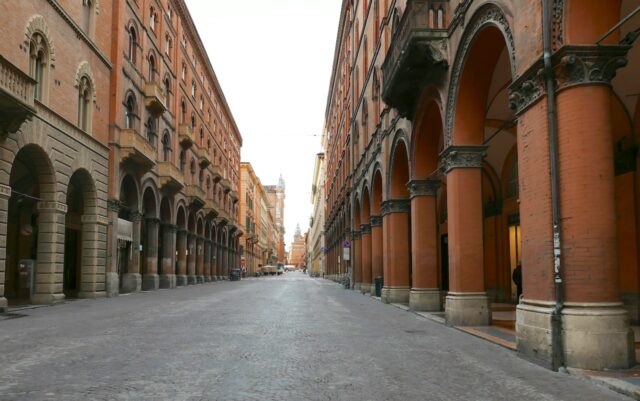 Via dell’Indipendenza on a Sunday morning (image by U.Bitumi/Unsplash)
Via dell’Indipendenza on a Sunday morning (image by U.Bitumi/Unsplash)
Make sure to also visit the Sunday flea and antique market in Piazza Santo Stefano, also the location of Basilica of San Stefano (a historic complex of seven churches).
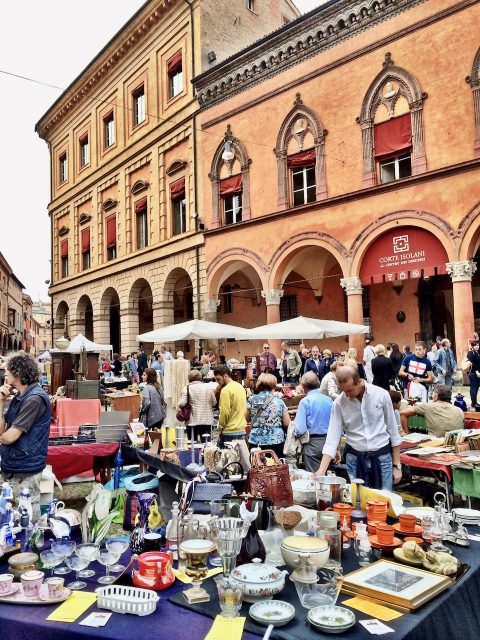 The Sunday flea and antique market.
The Sunday flea and antique market.
Read more about the Art Cities of Emilia Romagna
8. Get your gelato fix!
You can’t miss the ice-cream! My favourite place for absolutely sublime gelato is the Cremeria Funivia at Piazza Camillo Benso Cavour. There’s almost always a queue but it’s absolutely worth the wait!
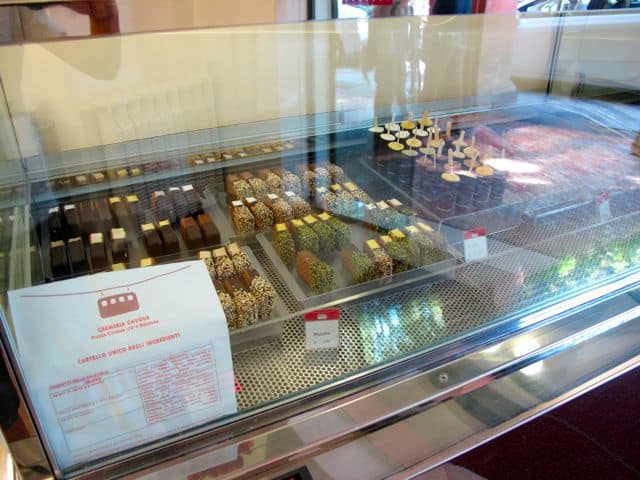 Cremeria Funivia
Cremeria Funivia
Other places to get the best gelato in Bologna include Cremeria Santo Stefano (Via Santo Stefano 70), Galliera 49 (Via Galliera 49) and La Sorbetteria Castglione (Via Castglione 44).
9. Find the canals
Not many visitors know this because they’re so well hidden but Bologna has a 60km network of canals running through and around the city! These channels fuelled Bologna’s textile industries in the 13th century. In Via Piella, look for a little wooden window and open it for a gorgeous view of the Reno Canal.
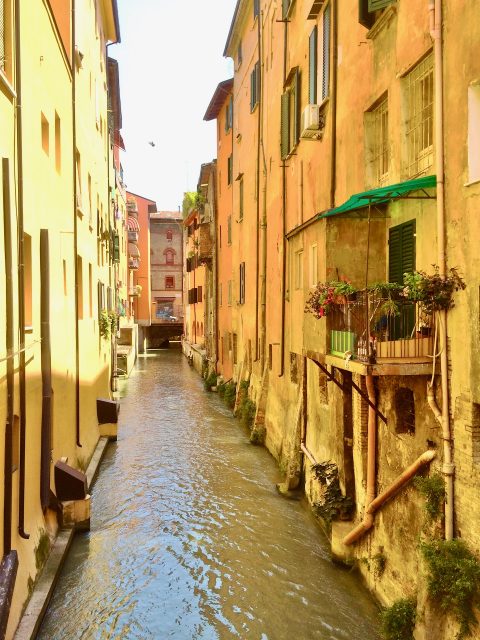 Open the little window for this view of the Reno Canal.
Open the little window for this view of the Reno Canal.
10. Shop for local produce
Once you’ve had your fill of Bologna’s cuisine and tried your hand at making fresh pasta, you’ll be tempted to take some of those ingredients home with you. Head for the Quadrilatero district just off Piazza Maggiore. A maze of little streets and alleys are home to stalls and old shops selling all sorts of delicacies and local wines. One deli you shouldn’t miss is Tamburini (via Caprarie, 1).
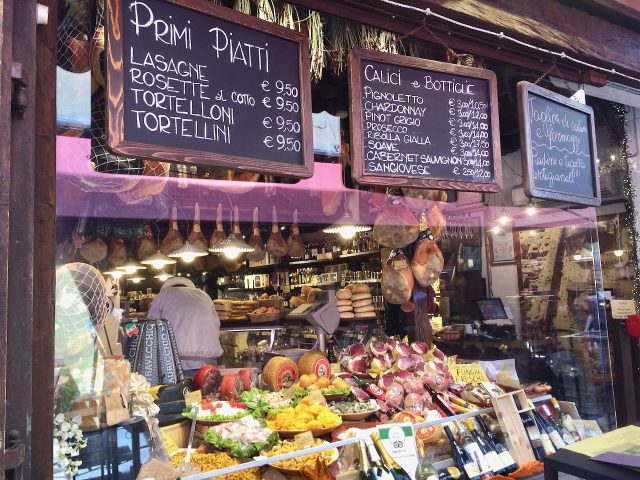 One of the many deli’s in the Quadrilatero district.
One of the many deli’s in the Quadrilatero district. 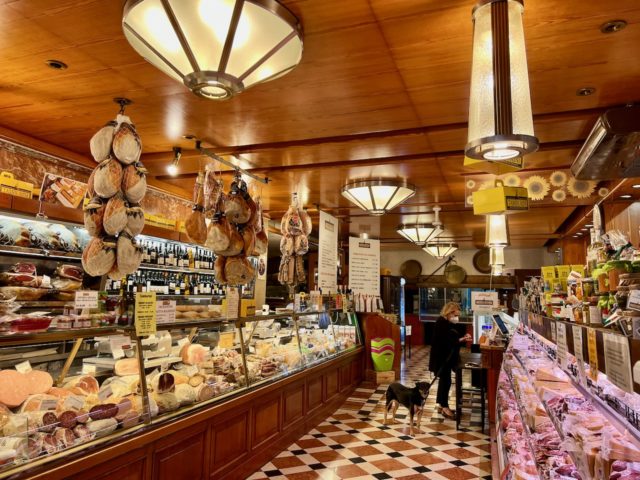 Tamburini deli
Tamburini deli
11. Whisper sweet somethings at Palazzo del Podestà
At Piazza Maggiore, across the square from the Basilica, stands the Palazzo del Podestà, where you’ll find the tourist office. Inside the building, where the two pathways cross, you might spot people standing in the corners facing the archways, with their backs to you. It’s a curious and fun thing that a local taught me about: due to the amazing acoustics in this space, if you stood in one corner and spoke to the wall (even a whisper), someone standing in the opposite corner will hear every word. The story goes that locals have been expressing their feelings, or breaking good or bad news to one another this way for centuries!
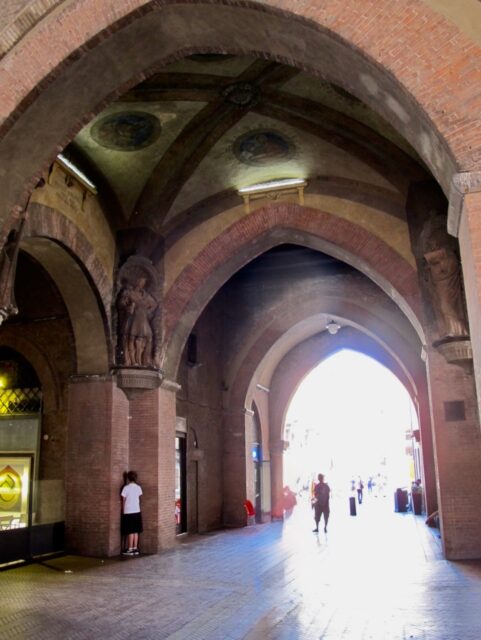 Palazzo del Podestà archways
Palazzo del Podestà archways
12. Venture into the Emilia Romagna region
Bologna is the railway hub between Rome and Milan, making it the perfect base to explore the region and farther afield (Florence and Venice are a short hop away on the new high-speed lines. See Italo trains or TrenItalia for more information). Emilia Romagna has numerous attractions and historic towns which shouldn’t be missed. Towns that should be high on your list include Ravenna, with its UNESCO Heritage sites, and Modena in the Motor Valley, home of the world famous balsamic vinegar and motor brands such as Ferrari, Lamborghini, Maserati and Ducati. You can also head for the beaches of the Adriatic coast, also called the Riviera Romagnola, and from here, inland to one of the smallest countries in the world: San Marino.
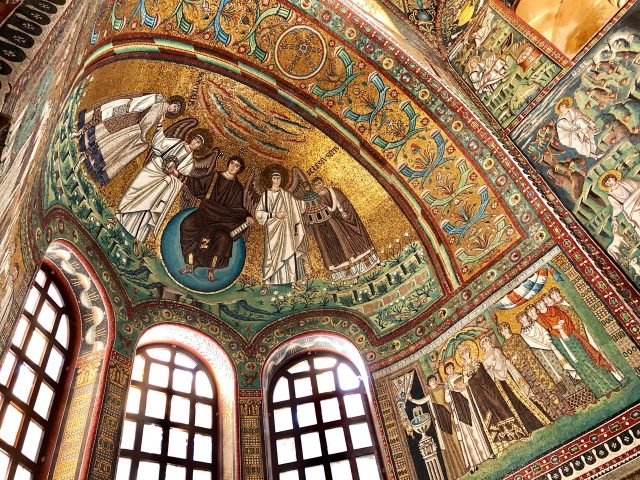 The stunning mosaics inside the Basilica di San Vitale in Ravenna.
The stunning mosaics inside the Basilica di San Vitale in Ravenna. 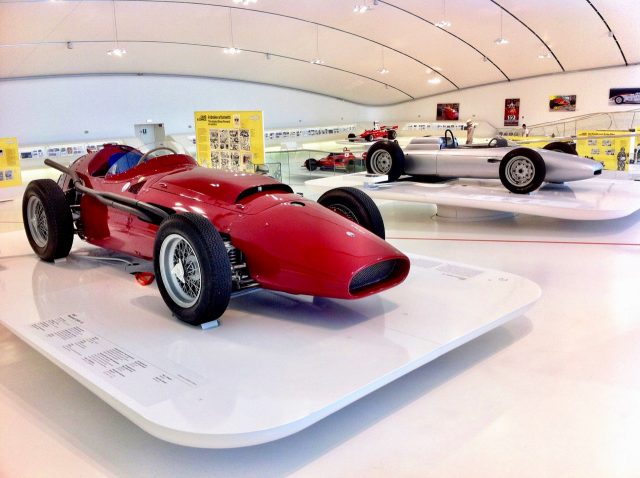 Some of the beautiful cars in the Enzo Ferrari Museum in Modena.
Some of the beautiful cars in the Enzo Ferrari Museum in Modena.
Bologna is also a featured destination in the Ultimate Euro Food Trip.
Read about things you must do in Emilia Romagna.
Save
Please visit:
Our Sponsor
